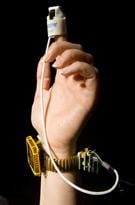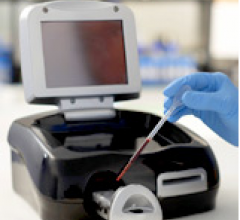The ACCULINK carotid stent is designed to provide easy and accurate stent placement in patients who have carotid atherosclerosis and who are at high risk for conventional surgery. The ACCULINK uses rapid exchange technology, enabling a single operator to easily control the embolic protection device and stent delivery system during catheter manipulations. The stent features an open-cell design.
The ACCUNET embolic protection system is designed to provide excellent capture capabilities and easy filter control when doctors perform carotid stenting interventions.

February 2, 2010 – Based on its recent research on the wearable energy harvesters market, Frost & Sullivan presented the Holst Centre and imec with the 2009 European Frost & Sullivan Award for Technology Innovation for its wearable electrocardiograph (ECG) energy harvesting solution. The system is powered by heat naturally dissipated from the human body.
Cardiac PET/CT represents a major advancement in cardiovascular diagnostics, offering significant clinical and ...
February 2, 2010 – Data published in EuroIntervention (EuroIntervention, 2010; 5:698-702) demonstrate good safety and efficacy, low target vessel revascularization (TVR) and no late stent thrombosis at one year in patients with ST-elevation myocardial infarction (STEMI) who underwent primary percutaneous coronary intervention (PCI) and implantation of the Genous Bio-Engineered R Stent.
February 2, 2010 - Two protocols for reduced-dose cardiac imaging, without compromising image quality, may help enhance the performance of gamma cameras by shortening acquisition times, enabling reduced radiopharmaceutical doses and increasing image resolution.
February 1, 2010 – The FDA granted market clearance for the PICC WAND introducer catheter, which enables clinicians to insert a peelable sheath for PICC or midline catheter placement using the new Accelerated Seldinger Technique (AST), for faster vascular access.
SPONSORED CONTENT — Studycast is a comprehensive imaging workflow system that allows healthcare professionals to work ...
February 1, 2010 – The design have been completed and a patent application filed for a troponin-I self-metering cartridge for the QL Care Analyzer point-of-care (POC) diagnostic device. The system does not require a lab technician. Troponin-I is used to diagnose the presence and severity of a heart attack.
February 1, 2010 – Three patent disputes between Boston Scientific Corp. and Johnson & Johnson (J&J) were settled today with Boston paying $1.7 billion. The disputes date back to 2003 and cover Boston Scientific’s Jang patent and J&J’s Palmaz and Gray patents, all of which involve intellectual property in the cardiovascular arena.
January 29, 2010 — Women who are at risk of lower-leg amputation fare even better than men when they have minimally invasive treatment to open up the blocked arteries causing the problem, suggest results of a study presented at the 22nd annual International Symposium on Endovascular Therapy (ISET) earlier this month.
Providing exceptional cardiovascular care for patients to achieve the best possible outcomes is the number one goal for ...
Jan. 25, 2010 — The first commercial implants of the ATS 3f Enable Aortic Bioprosthesis were recently performed at the University of Berne Hospital, Berne, Switzerland by Lars Englberger, M.D., Mario Stalder, M.D., and professor Thierry Carrel. The procedures were completed using a sutureless technique and the patients are recovering with no complications.
January 26, 2010 — According to data appearing today in JAMA , patients with atrial fibrillation, a common heart rhythm disorder, who were treated with catheter ablation using the NaviStar ThermoCool Catheter demonstrated significantly better outcomes at one year compared to those receiving drug therapy.
January 28, 2010 – Minimally invasively emergency repair of ruptured abdominal aortic aneurysms (AAA) using stent grafts could save more lives in some cases than traditional open surgery, new data suggests. The latest research on AAA was presented at the 22nd annual International Symposium on Endovascular Therapy (ISET).
Cardiac positron emission tomography (PET) is growing in popularity among cardiologists because it provides the ability ...
January 27, 2010 – Robust blood pressure measurements via fiberoptic sensors will be added to the Abiomed Impella percutaneous ventricular assist device (P-VAD).
January 27, 2010 – New 6, 7 and 8 mm diameters of the Maris Plus self-expanding peripheral stent system, were launched today in Europe for interventions involving the superficial femoral arteries (SFA). The 9, 10 and 12mm diameters of the stent are already marketed for the iliac artery.
January 27, 2010 – A German study enrolled its first 20 patients to investigate the utility of muscular counter pulsation (MCP) in patients with early-stage heart failure.


 February 02, 2010
February 02, 2010













